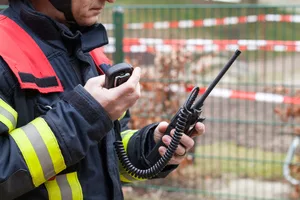The Airwave Network provides an essential dedicated mobile network that the police, fire, ambulance and other emergency services use to communicate securely.
A market investigation by the UK’s Competition and Markets Authority (CMA), conducted by an independent group of experts, has found that the market is not working well and the emergency services have no choice but to carry on using the Airwave Network. As a result, Motorola, which owns the company that operates the network, can charge the Home Office (which negotiates the contracts on behalf of the emergency services) prices well above competitive levels, resulting in higher costs which are ultimately paid by taxpayers.
The CMA has imposed a price cap under the Enterprise Act 2002 to limit the price that Motorola can charge to a level that would apply in a well-functioning, competitive market, putting an end to the estimated [£200 million (€227.93 million)] per year of over-charging. There will be a review in 2026, but the cap has been set to apply to the end of 2029.
The Airwave Network was originally commissioned by the Home Office through an open procurement exercise in 2000. The original contract, which was due to end in late 2019 or early 2020, was to build and operate the Airwave Network – and the network was expected to be shut down and replaced by a new secure communications solution using a commercial 4G mobile network, the emergency services network (ESN), when the contract ended.
However, because the new ESN network was not ready for switchover as planned and is not expected to be ready until at least 2026 and more likely 2029, the emergency services continue to rely on the Airwave Network, which is a monopoly provider of these essential communications services.
The price set under the original agreement included the capital costs of building the network. By the time the period covered by the original agreement ended, that cost should have been recouped, and the price should have fallen substantially at that point – in the same way that consumers can get cheaper mobile deals after they have paid off their handset. This did not happen, and prices remained at substantially the same level. But unlike consumers with mobile phones, the emergency services have no choice of an alternative supplier.
Martin Coleman, chair of the CMA’s independent inquiry group, says “Our emergency services have to use the Airwave Network to protect the public and themselves. When the original contract period for the Airwave Network came to an end, there was no alternative provider so Motorola held all the cards when it came to pricing. As a result, the emergency services are locked in with a monopoly provider with no option but to pay a much higher price than they would if the market was working well.
“We are generally reluctant to impose price controls, but the particular circumstances of this case mean that a price cap is the only effective way of ensuring the emergency services, and the taxpayers who fund them, aren’t paying considerably over the odds. The cap will end the supernormal profits that Motorola has been making while allowing it to make a fair return.”
In response, Motorola issued a statement saying: “Motorola Solutions strongly disagrees with the CMA’s final decision and believes it cannot be justified on competitive, economic or legal grounds. We will appeal the decision.
“In 2016, the Home Office negotiated and agreed to the fixed price Airwave contracts, which were also provided to the CMA as part of the CMA’s approval of Motorola Solutions’ acquisition of Airwave. Despite the CMA finding no shortcomings in Airwave’s exceptional service, the CMA intends to forcibly reduce the contractually agreed pricing going forward. We believe this unprecedented overreach will have a chilling effect on long-term investment and contracting with the U.K. government.
“Motorola Solutions is committed to vigorously protecting its contractual position in delivering the Airwave network, an essential service that operates at the highest levels and is relied upon by the 300,000 emergency services professionals who protect communities across the U.K. every day.”
Charge control
The charge control will limit the price of the Airwave Network services to a level that would apply in a competitive market. It will, in the CMA’s judgement, mitigate the detrimental effects on customers (the emergency services and ultimately taxpayers) from Airwave Solutions’ and Motorola’s market ability, in effect lowering prices by almost [£200 million (€227.93 million) a year.
To the extent they will no longer be earning supernormal profits, the charge control will also reduce Airwave Solutions’ and Motorola’s incentives to delay the delivery of technology that will help shut down the network and to slow down the transition to a more modern replacement.
The charge control is set at a level that will end the supernormal profits but will allow Motorola to continue to invest in the network and ensure that quality and safety is maintained. It will come into force later this year and will be subject to a review in 2026.
While the charge control is necessary to limit the price of the services for the rest of the decade, the CMA’s decision also recognises the need to encourage competition in the longer term. Accordingly, the CMA is also making a formal recommendation to the Home Office to come up with a plan so that, when the charge control ends, the price of emergency communications network services is set competitively.
The CMA opened its investigation in October 2021 following concerns that the market might not be working well, resulting in an unnecessarily expensive service. The CMA announced its provisional view in October 2022 and has published its final decision.
For more information, click here.
Comment on this article below or via Twitter: @VanillaPlus OR @jcvplus






